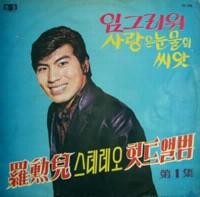entertainment: class and regions
| Since this blog likes to present itself as a serious place, even a note about two pieces concerning entertainment has the words "class" and "region" in the title. But as the pieces do address these issues, hunjangûi karûch'im can maintain its facade. Class In a recently airing drama Hanûrisiyô ("You are the heaven" or something), which has a love story between a TV entertainer (t'aellônt'û, "talent") and a make-up artist (punjangsa), a piece of dialogue has raised the ire of the association of broadcasting make-up artists. In it a family member of the entertainer scolds him for going out with a mere make-up artist, when there are CEO's daughters and hospital owners' daughters around. The association demanded an apology, which was promptly aired. Punjangsa; when I first saw the word I thought it was about selling make-up, pun-changsa, but understood quickly that it was a profession of doing make-up, punjang, with -sa marking the profession (see Standard Korean Dictionary). And I mean profession - or at least the term means it, as there is the character "teacher(sûsûng) sa (師), and you just don't mess with a "sa-profession" like this. On the other hand, the dialogue which offended the association should not be so much off the mark concerning what many think of the status of professions - that the association could not deny, but don't condemn them for taking offence. (Seems that the kind of a Cinderella story setting of Hanûrisiyô isn't that different from "Stay strong, Geum-sun" (Kûmsuna, kutsewora?), in which the protagonist was a hairdresser. Judging from the lack of this kind of response and the apparently good reception that the drama got, it has been void of this kind of over-honest writing.) Region
Chosun Ilbo also has a longish interview on the all-Korean singer Na Hun-a (羅勳兒, real name Ch'oe Hong-gi), who is nearing the 40th year of his career. I don't really know what hits Mr Na has had and haven't listened to his music, but he surely is an interesting case of Korean popular culture. And Grandfather Kwôn, who has been one of my research informants and whom I've introduced for example in this entry, told that Na Hun-a was a customer in the men's clothing business that he used to have in the 1970s. ― When talking about Na Hun-a, one can't leave aside the rivalry with Nam Jin in teh 60s and 70s.Na has a huge scar in his left cheek from an attack with a broken bottle by a spectator in a concert in Mokpo (southern Jeolla). Na also tells that he's had a lot of fights with gangsters loitering around entertainers. "I couldn't stand the gangsters who came to the dressing rooms and grabbed dancers' breasts." As an additional note on a piece of Korean cultural history, let's also mention the alleged love affair that Na had in the 1970s with the actress Kim Chi-mi (for pics and text on her, see here, here, and here) Categories at del.icio.us/hunjang: music ∙ stratification ∙ Koreansociety ∙ Koreanlanguage |





Comments to note "entertainment: class and regions" (Comments to posts older than 14 days are moderated)
Write a Comment